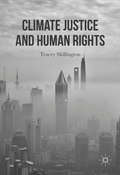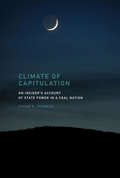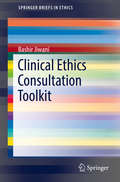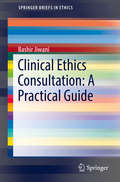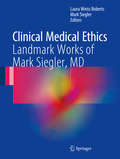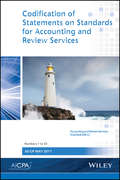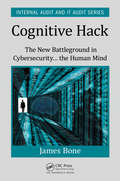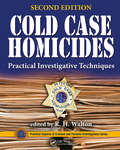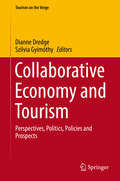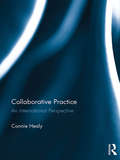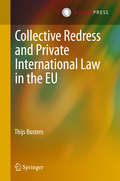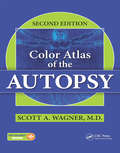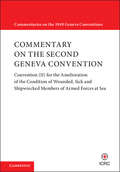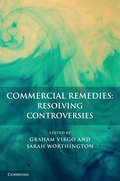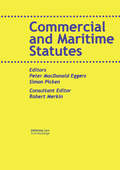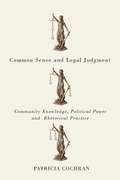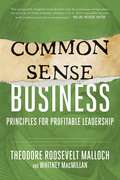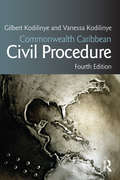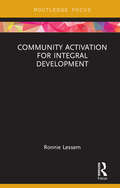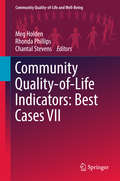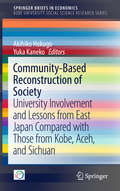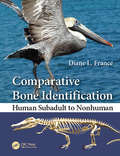- Table View
- List View
Climate Justice and Human Rights
by Tracey SkillingtonThis book shows that escalating climate destruction today is not the product of public indifference, but of the blocked democratic freedoms of peoples across the world to resist unwanted degrees of capitalist interference with their ecological fate or capacity to change the course of ecological disaster. The author assesses how this state of affairs might be reversed and the societal relevance of universal human rights rejuvenated. It explores how freedom from want, war, persecution and fear of ecological catastrophe might be better secured in the future through a democratic reorganization of procedures of natural resource management and problem resolution amongst self-determining communities. It looks at how increasing human vulnerability to climate destruction forms the basis of a new peoples-powered demand for greater climate justice, as well as a global movement for preventative action and reflexive societal learning.
Climate of Capitulation: An Insider's Account of State Power in a Coal Nation
by Vivian E. ThomsonHow power is wielded in environmental policy making at the state level, and how to redress the ingrained favoritism toward coal and electric utilities. The United States has pledged to the world community a reduction in greenhouse gas emissions by 26–28 percent below 2005 levels in 2025. Because much of this reduction must come from electric utilities, especially coal-fired power plants, coal states will make or break the U.S. commitment to emissions reduction. In Climate of Capitulation, Vivian Thomson offers an insider's account of how power is wielded in environmental policy making at the state level. Thomson, a former member of Virginia's State Air Pollution Control Board, identifies a “climate of capitulation” in state government—a deeply rooted favoritism toward coal and electric utilities in states' air pollution policies.Thomson narrates three cases involving coal and air pollution from her time on the Air Board. She illuminates the overt and covert power struggles surrounding air pollution limits for a coal-fired power plant just across the Potomac from Washington, for a controversial new coal-fired electrical generation plant in coal country, and for coal dust pollution from truck traffic in a country hollow. Thomson links Virginia's climate of capitulation with campaign donations that make legislators politically indebted to coal and electric utility interests, a traditionalistic political culture tending to inertia, and a part-time legislature that depended on outside groups for information and bill drafting. Extending her analysis to fifteen other coal-dependent states, Thomson offers policy reforms aimed at mitigating the ingrained biases toward coal and electric utilities in states' air pollution policy making.
Clinical Ethics Consultation Toolkit (SpringerBriefs in Ethics)
by Bashir JiwaniThis workbook is a companion to Clinical Ethics Consultation: A Practical Guide to Changing Culture, Building Capacity and Solving Problems Case by Case. The Toolkit lays out the process for clinical ethics consultation in a series of steps within five phases: Pre-Consult, Interviews, Mid-Consult, Consult meeting(s), and Post-Consult. For each step, the Toolkit provides directions for how to complete it, tips for success, and worksheets for capturing data and analysis. The Clinical Ethics Consultation Toolkit is the playbook from which clinical ethics consultants can draw methods and strategies for effectively delivering ethics consultation.
Clinical Ethics Consultation: A Practical Guide (SpringerBriefs in Ethics)
by Bashir JiwaniThis book provides a careful and comprehensive, step-by-step method for providing clinical ethics consultation. This Guide can be applied in almost any healthcare setting and takes the reader from establishing an intake process and developing strategies for interviewing those involved in the situation, to undertaking a consultation meeting and following up on a clinical consult. The book is an invaluable resource to any clinical ethicist, or committee or consult team member who is seeking to provide their service with rigour and quality. Written in simple language, the book explores ideas and concepts that will help the reader to understand, think through, and ultimately offer useful ethical consultation when facing ethically challenging issues.
Clinical Medical Ethics: Landmark Works of Mark Siegler, MD
by Laura Weiss Roberts Mark SieglerThis instant gold standard title is a major contribution to the field of clinical medical ethics and will be used widely for reference and teaching purposes for years to come. Throughout his career, Mark Siegler, MD, has written on topics ranging from the teaching of clinical medical ethics to end-of-life decision-making and the ethics of advances in technology. With more than 200 journal publications and 60 book chapters published in this area over the course of his illustrious career, Dr. Siegler has become the pre-eminent scholar and teacher in the field. Indeed his work has had a profound impact on a range of therapeutic areas, especially internal medicine, pediatrics, surgery, oncology, and medical education. Having grown steadily in importance the last 30 years, clinical ethics examines the practical, everyday ethical issues that arise in encounters among patients, doctors, nurses, allied health workers, and health care institutions. The goal of clinical ethics is to improve patient care and patient outcomes, and almost every large hospital now has an ethics committee or ethics consultation service to help resolve clinical ethical problems; and almost every medical organization now has an ethics committee and code of ethics. Most significantly, clinical ethics discussions have become a part of the routine clinical discourse that occurs in outpatient and inpatient clinical settings across the country. This seminal collection of 46 landmark works by Dr. Siegler on the topic is organized around five themes of foundational scholarship: restoring and transforming the ethical basis of modern clinical medicine, the doctor-patient relationship, education and professionalism, end-of-life care, and clinical innovation. With introductory perspectives by a group of renowned scholars in medicine, Clinical Medical Ethics: Landmark Works of Mark Siegler, MD explains the field authoritatively and comprehensively and will be of invaluable assistance to all clinicians and scholars concerned with clinical ethics.
Closing the Courthouse Door: How Your Constitutional Rights Became Unenforceable
by Erwin ChemerinskyA leading legal scholar explores how the constitutional right to seek justice has been restricted by the Supreme Court The Supreme Court's decisions on constitutional rights are well known and much talked about. But individuals who want to defend those rights need something else as well: access to courts that can rule on their complaints. And on matters of access, the Court's record over the past generation has been almost uniformly hostile to the enforcement of individual citizens' constitutional rights. The Court has restricted who has standing to sue, expanded the immunity of governments and government workers, limited the kinds of cases the federal courts can hear, and restricted the right of habeas corpus. Closing the Courthouse Door, by the distinguished legal scholar Erwin Chemerinsky, is the first book to show the effect of these decisions: taken together, they add up to a growing limitation on citizens' ability to defend their rights under the Constitution. Using many stories of people whose rights have been trampled yet who had no legal recourse, Chemerinsky argues that enforcing the Constitution should be the federal courts' primary purpose, and they should not be barred from considering any constitutional question.
Codification of Statements on Standards for Accounting and Review Services: Numbers 1-23
by AicpaIn addition to SSARS No. 21, which is now effective, this edition includes two newly released Statements on Standards for Accounting and Review Services (SSARS): SSARS No. 22, Compilation of Pro Forma Financial Information, and SSARS No. 23, Omnibus Statement on Standards for Accounting and Review Services—2016. The codification statements are fully indexed and arranged by subject. The guidance (and related interpretations to the extent applicable) help apply the standards in specific circumstances and clearly show amendments, deleted or superseded portions, and conforming changes due to the issuance of other authoritative guidance.
Cognitive Hack: The New Battleground in Cybersecurity ... the Human Mind (Security, Audit and Leadership Series)
by James BoneThis book explores a broad cross section of research and actual case studies to draw out new insights that may be used to build a benchmark for IT security professionals. This research takes a deeper dive beneath the surface of the analysis to uncover novel ways to mitigate data security vulnerabilities, connect the dots and identify patterns in the data on breaches. This analysis will assist security professionals not only in benchmarking their risk management programs but also in identifying forward looking security measures to narrow the path of future vulnerabilities.
Cold Case Homicides: Practical Investigative Techniques, Second Edition (Practical Aspects of Criminal and Forensic Investigations)
by R.H. WaltonThis book, now in its second edition, is the first and most exhaustive text covering the still growing popularity of cold case investigations which locate perpetrators and free the innocent. The new edition adds approximately 80 pages of content, including material on clandestine graves and investigating cold gang cases. The book merges theory with practice through the use of case histories, photographs, illustrations and checklists that convey essential, fundamental concepts while providing a strong, practical basis for the investigative process.
Collaborative Economy and Tourism
by Dianne Dredge Szilvia GyimóthyThis book employs an interdisciplinary, cross-sectoral lens to explore the collaborative dynamics that are currently disrupting, re-creating and transforming the production and consumption of tourism. House swapping, ridesharing, voluntourism, couchsurfing, dinner hosting, social enterprise and similar phenomena are among these collective innovations in tourism that are shaking the very bedrock of an industrial system that has been traditionally sustained along commercial value chains. To date there has been very little investigation of these trends, which have been inspired by, amongst other things, de-industrialization processes and post-capitalist forms of production and consumption, postmaterialism, the rise of the third sector and collaborative governance. Addressing that gap, this book explores the character, depth and breadth of these disruptions, the creative opportunities for tourism that are emerging from them, and how governments are responding to these new challenges. In doing so, the book provides both theoretical and practical insights into the future of tourism in a world that is, paradoxically, becoming both increasingly collaborative and individualized.
Collaborative Practice: An International Perspective
by Connie HealyCollaborative practice is a new method of dispute resolution, used mainly in family law matters. By taking a non-adversarial approach, it challenges the strictly positivist view of the lawyer as ‘zealous advocate’ for the client. As such, it has received much criticism from the established Bar and legal profession. This book provides a doctrinal and empirical analysis of collaborative practice with a view to assessing its place within the dispute resolution continuum and addressing whether this criticism has been justified. It begins by establishing the theoretical underpinnings of conflict and differing approaches to conflict resolution, the impact of the comprehensive law movement and therapeutic jurisprudence. The origins and development of the collaborative process and the framework it provides for a multidisciplinary approach to conflict resolution is outlined. The book addresses the examination of the process undertaken in the lead up to the enactment of the Uniform Collaborative Law Act in 2010; now regarded as a model of best practice. Finally, through an examination of empirical research undertaken in the US, Canada and in England and Wales, and in presenting the results of the first known empirical research into the process in an Irish family law context, the book concludes with an evidenced based analysis of the process from the perspective of couples who chose to use the collaborative model to resolve the issues surrounding their relationship breakdown, collaborative lawyers and lawyers who do not advocate a non-adversarial approach. As such this book provides a valuable insight into the process which will be of interest to: academics; practising lawyers; members of the judiciary; researchers in the fields of conflict resolution and family law and for students studying alternative dispute resolution (ADR).
Collective Redress and Private International Law in the EU
by Thijs BostersThis book specifically covers issues regarding jurisdiction and the recognition and enforcement of judgments in cross-border mass disputes relating to financial services. Collective redress mechanisms, legal mechanisms which can be used to resolve mass disputes collectively, are growing more important. Due to the global increase in cross-border trade and financial transactions, the number of cross-border mass disputes has increased. In the EU, several prototypes of collective redress mechanism exist that can be used to resolve mass disputes and recently, aside from the EU's recommendation on the drafting of laws relating to collective redress, a re-evaluation of the Brussels Regulation has also taken place as on 10 January 2015 the Brussels I-bis Regulation replaced the old Brussels Regulation dating from 2000. In spite of a minor reference to collective redress in the Commission proposal, Brussels I-bis does not contain any provision relating to collective redress. As a result, many questions regarding cross-border mass disputes and the relevant private international law issues remain unanswered and unresolved. This book sets out to describe the most important prototypes by referring to actual collective redress mechanisms. In addition, it also sets out how parties to such mass disputes can confer jurisdiction to courts in the EU and what the various pitfalls are. Moreover, the rules concerning the recognition and enforcement of judgments originating from a collective procedure are listed. As cross-border collective redress mechanisms and the rules of private international law to be used in such a context are still being developed, the goals of private international law and the goals of the referred collective redress mechanisms are analysed to provide an insight into how these sets of rules should and could be employed. This book is primarily aimed at researchers, practitioners and lawmakers actively involved in and/or professionally interested in the field of private international law and collective redress mechanisms and should prove very useful in providing them with a greater in-depth understanding of the issues at hand. Thijs Bosters is a law clerk at the Dutch Supreme Court. Prior to his work at the Supreme Court, he was an attorney-at-law with NautaDutilh in The Netherlands, where he worked in the Litigation & Arbitration department.
Color Atlas of the Autopsy
by Scott A. WagnerIn keeping with the spirit of the first edition, the second edition of this book displays the autopsy procedure in a step-wise, start-to-finish fashion. While the autopsy itself has changed little over the last 100 years, the adjunct procedures—toxicology, radiology, and DNA analysis, among others—have changed greatly. Original chapters are fully updated and modified to reflect changes in the last 15 years. Additionally, two new chapters have been added on natural death and organ/tissue donation.
Colorado Driver Handbook
by Colorado Department of Revenue Division of Motor VehiclesThe Driver Handbook is a summary of the laws, rules and safe driving practices that apply to all persons who drive a vehicle in the state of Colorado. It is based on current laws, legislation and department policies and is subject to change. It is not a book of laws and should not be used as a basis for any legal claims or actions. It is a book of information only and does not supersede Colorado Revised Statutes. Traffic regulations in cities, towns, counties and federal territories may go beyond state laws, as long as they do not conflict with state law. For more information on Colorado motor vehicle laws refer to the Colorado Revised Statutes (C.R.S.) Vehicles and Traffic, Title 42 Common Code book.
Commentary on the Second Geneva Convention: Convention (II) for the Amelioration of the Condition of Wounded, Sick and Shipwrecked Members of Armed Forces at Sea (Commentaries on the 1949 Geneva Conventions)
by Lindsey Cameron Eve Knut Dörmann Liesbeth Lijnzaad Marco Sassòli Bruno Demeyere La Haye Heike Philip Spoerri Niebergall-Lackner Jean-Marie HenckaertsThe application and interpretation of the four Geneva Conventions of 1949 have developed significantly in the sixty years since the International Committee of the Red Cross (ICRC) first published its Commentaries on these important humanitarian treaties. To promote a better understanding of, and respect for, this body of law, the ICRC commissioned a comprehensive update of its original Commentaries, of which this is the second volume. Its preparation was coordinated by Jean-Marie Henckaerts, ICRC legal adviser and head of the project to update the Commentaries. The Second Convention is a key text of international humanitarian law. It contains the essential rules on the protection of the wounded, sick and shipwrecked at sea, those assigned to their care, and the vessels used for their treatment and evacuation. This article-by-article Commentary takes into account developments in the law and practice to provide up-to-date interpretations of the Convention. The new Commentary has been reviewed by humanitarian-law practitioners and academics from around the world, including naval experts. It is an essential tool for anyone working or studying within this field. The second installment in a series of article-by-article commentaries on the Second Geneva Convention and Additional Protocols issued by the International Committee of the Red Cross, capturing contemporary developments in their application and interpretation. Contains thorough and up-to-date interpretations from an extensive process involving both the International Committee of the Red Cross and external contributors, as well as peer review by academics and international humanitarian law practitioners, ensuring coherent content while accurately reflecting diverging views. Provides practitioners and scholars with easy access to comprehensive, high-quality legal information.
Commercial Remedies: Resolving Controversies
by Virgo Graham Qc Worthington Sarah Qc Hon FbaThe law of commercial remedies raises a number of important doctrinal, theoretical and practical controversies which deserve sustained and rigorous examination. This volume explores such controversies and suggests solutions, which is essential to ensure that the law is defensible, clear and just. With contributions from twenty-three leading academic and practitioner experts, this book addresses significant issues in the law which, taken together, range across the entire remedial jurisdiction as it applies to commercial disputes. The book primarily focuses on the resolution of controversies in the English law of commercial remedies, but recent developments elsewhere are also considered, especially in other common law jurisdictions. The result provides remarkably comprehensive coverage of the field which will be of relevance to academics, students, judges and practitioners.
Commercial and Maritime Statutes: Commercial And Maritime Statutes (Maritime and Transport Law Library)
by Peter MacDonald Eggers Simon PickenThis collection of statutes form a reference point for the maritime, commercial and insurance litigator. It covers 35 statutes, some with a commentary and list of key cases to aid with interpretation of the statute.
Common Sense and Legal Judgment: Community Knowledge, Political Power, and Rhetorical Practice
by Patricia CochranWhat does it mean when a judge in a court of law uses the phrase “common sense”? Is it a type of evidence or a mode of reasoning? In a world characterized by material and political inequalities, whose common sense should inform the law? Common Sense and Legal Judgment explores this rhetorically powerful phrase, arguing that common sense, when invoked in political and legal discourses without adequate reflection, poses a threat to the quality and legitimacy of legal judgment. Often operating in the service of conservatism, populism, or majoritarianism, common sense can harbour stereotypes, reproduce unjust power relations, and silence marginalized people. Nevertheless, drawing the works of theorists such as Thomas Reid, Antonio Gramsci, and Hannah Arendt into conversation with rulings by the Supreme Court of Canada, Patricia Cochran demonstrates that with careful attention, the democratic, egalitarian, and community-sustaining aspects of common sense can be brought to light. A call for critical self-reflection and the close scrutiny of power relationships and social contexts, this book is a direct response to social justice predicaments and their confounding relationships to law. Creative and interdisciplinary, Common Sense and Legal Judgment reinvigorates feminist and anti-poverty understandings of judgment, knowledge, justice, and accountability.
Common-Sense Business: Principles for Profitable Leadership
by Theodore Roosevelt Malloch Whitney MacMillan“Has the potential to transform how all companies are run…Nothing could be more valuable!”—Mark Drewell, CEO, Globally Responsible Leadership Initiative (GRLI) From two of the world’s most successful business leaders comes Common-Sense Business—an accessible, actionable guide to better leadership, increased profits, and a more sustainable economic model predicated on prudence and socially conscious business. Common sense and prudence have long been among the guiding tenets of society, but in today’s economy they have been completely abandoned in the interest of blindly maximizing profits. Common-Sense Business shows that this current economic model is both detrimental and unsustainable, and that we must transform the global economy along the lines of common sense toward the common good. Ted Malloch, a thought leader and policy influencer in global economic strategy, and Whitney MacMillan, the former chairman and CEO of the world’s largest private corporation, draw on recent research, history’s greatest minds, and their own successes to explain that ethically driven business is both a moral and financial necessity. Inspired by Thomas Paine’s Common Sense, this work explains to readers in all walks of life that ethically driven business will lead to better long-term profits, larger customer bases and more positive customer relations, and a holistically improved business. This book is a must-read for business owners, entrepreneurs, students, and businessmen and women in all sectors of the economy.
Commonwealth Caribbean Civil Procedure (Commonwealth Caribbean Law)
by Gilbert Kodilinye Vanessa KodilinyeThis new fourth edition of a well-established book is a timely response to the continuing development of the new rules of civil procedure in force in most of the jurisdictions of the English-speaking Caribbean. The new edition has been substantially revised to cover amendments to, and recent case law interpreting and applying, the Civil Procedure Rules of the various territories. It is essential reading for law students and legal practitioners in the region.
Communication and Bioethics at the End of Life: Real Cases, Real Dilemmas
by Lori A. Roscoe David P. SchenckThis casebook provides a set of cases that reveal the current complexity of medical decision-making, ethical reasoning, and communication at the end of life for hospitalized patients and those who care for and about them. End-of-life issues are a controversial part of medical practice and of everyday life. Working through these cases illuminates both the practical and philosophical challenges presented by the moral problems that surface in contemporary end-of-life care. Each case involved real people, with varying goals and constraints,who tried to make the best decisions possible under demanding conditions. Though there were no easy solutions, nor ones that satisfied all stakeholders, there are important lessons to be learned about the ways end-of-life care can continue to improve. This advanced casebook is a must-read for medical and nursing students, students in the allied health professions, health communication scholars, bioethicists, those studying hospital and public administration, as well as for practicing physicians and educators.
Community Activation for Integral Development (Transformation and Innovation)
by Ronnie LessemAs mass global and social media communications spread across the globe, we are seeing a need for a change in the way we approach issues of political and economic development. The effects of these growing communications are that, on the one hand, we see the significance of place rising, while on the other, marginalized people clamour to be heard and identities become increasingly threatened. We are quickly realizing that a ‘one-size fits all’ approach is not going to work. Despite more than half a century of attempts to address issues of development, we have seen fairly bleak results. In fact, the rising of economic stars, such as Japan and the Pacific Tigers hitherto, and China and India of late, have little to do with such programs of development or cultural studies, notwithstanding their accomplishment. Typically, such successes have developed top-down, with theories born and bred in the ‘West’ affecting,or maligning, practices in the ‘rest’. The approach taken in this book looks at these developments by turning them on their head: instead, starting bottom-up with an emphasis on what the author terms ‘community activation’. With a selection of case studies, this volume looks at where community activation can be found and explores how it could evolve and be of use in developing societies at large. In the process, he addresses such topics as how to embed development in a particular society, how to generate social and economic solidarity, and how to generate wealth from pre-industrial and post-industrial networks. This book provides a guide for readers on how to build community within their organization-and-society from the ground up.
Community Quality-of-Life Indicators: Best Cases VII (Community Quality-of-Life and Well-Being)
by Rhonda Phillips Meg Holden Chantal StevensThis book is the seventh volume in a series covering best practices in community quality of life indicators. The case studies and analysis in this volume demonstrate how community indicators projects today operate within a need to amplify the voice of disadvantaged communities, seriously explore the increasing use of information technology, produce positive community change and sustain these efforts over time. The work presented here spans North American and Australian community work and demonstrates how the field of community indicators has undergone a rapid evolution in only a few decades. Today as in their original formulations, community indicators projects are designed to gauge the social, economic and physical health and well-being of communities.
Community-Based Reconstruction of Society: University Involvement and Lessons from East Japan Compared with Those from Kobe, Aceh, and Sichuan (SpringerBriefs in Economics)
by Akihiko Hokugo Yuka KanekoThis volume presents an academic proposal, developed by a joint research group of leading scholars in the social and natural sciences from universities affected by global-scale mega disasters occurring in Asia in recent decades. These include Kobe University, which experienced the 1995 Hanshin-Awaji Earthquake; Tohoku University and Iwate University, both at the center of post-disaster reconstruction following the 2011 East Japan Earthquake and Tsunami; Syiah Kuala University in Aceh, Indonesia, which was hard-hit by the 2004 Indian Ocean Tsunami; and Sichuan University, which took a leading role in post-disaster recovery following the 2004 Sichuan Earthquake. Presenting a comparative analysis focused on lessons learned from the recovery phase following the East Japan Earthquake and Tsunami, the book addresses in detail the questions of what should be done to enable truly community-based town planning, and what roles should be played by universities in order to achieve those goals.
Comparative Bone Identification: Human Subadult to Nonhuman
by Diane L. FranceBuilding on the success, and maintaining the format, of the best-selling Human and Nonhuman Bone Identification: A Color Atlas (ISBN: 978-1-4200-6286-1), Comparative Bone Identification: Human Subadult to Nonhuman presents new images of human bones representing many states of maturation from neonate to 20 years old. It also extends the scope of the former work by focusing on the smaller bones of fetuses and young humans and comparing them to bones of birds, reptiles, marine mammals, fish, and a frog that may be confused with those of a subadult human. The book begins with a section on general osteology and explains the major anatomical differences between humans and other animals. The second section compares human and nonhuman bones, categorized by type of bone, and includes most of the major bones in humans and nonhumans. The third section presents skeletons within species. Containing nearly 3,500 color photographs, the book provides examples of similar bones in nonhuman species that may be confused with the human bone in question. The bone images are also taken from different angles to enhance detailed understanding. A practical comparative guide to the differences among species for nearly all bones in the body, this book is a valuable resource for the laboratory or in the field. It uses a visual approach with annotations pointing out salient features of the most commonly discovered bones, giving clear examples for use by law enforcement, medicolegal death investigators, forensic anthropologists, students, and readers who wish to distinguish between human bones and those of the a variety of animal species.
